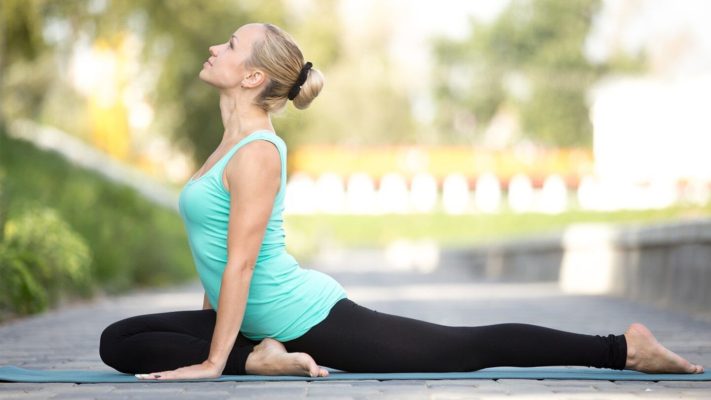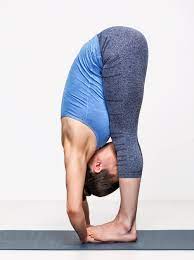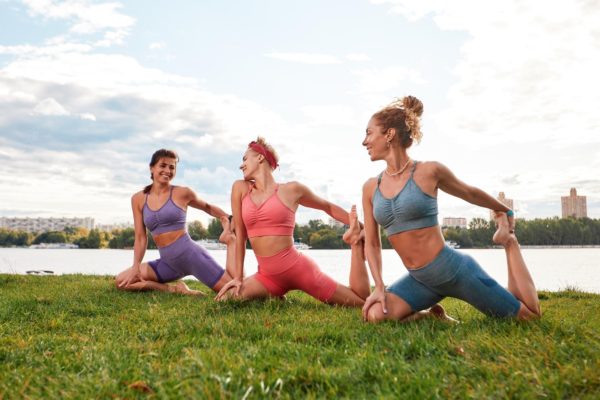Yoga poses for beginners to promote relaxation

Yoga poses for beginners to promote relaxation:
Challenging activities stimulate the body’s sympathetic nervous system, which provokes what’s known as the “fight-or-flight” response. This puts your normal body functions on hold (such as digestion), while your body prepares for survival. Yoga creates the opposite reaction. Relaxing your body and mind stimulates the parasympathetic nervous system, also known as the “rest-and-digest” response. Your internal organs return to their normal functions and your body can once again perform at its peak. Regularly practicing relaxing yoga poses can keep your body and mind in tip-top shape!
While yoga is a physical practice, it is also historically a spiritual and emotional one — and its benefits for your mental health are widely recognized. Due to its meditative aspects, many people practice yoga to de-stress as much as to strengthen and stretch their bodies. That said, if you’ve previously not given yoga a try because you’re uncertain about your flexibility, strength, or balance, it’s helpful to know that you don’t have to be an expert to reap some of the stress-relieving benefits
We all face stress in our day-to-day life. Each one of us has a different reason to feel stressed and a unique way to deal with it. While some of us prefer to sweat it out with exercise, others might prefer a comparatively relaxing approach to yoga.
For those who prefer yoga to battle off their stress and enjoy other health benefits that it has to offer we are suggesting 15 yoga poses to make your journey smooth.
When it comes to soothing the body and mind, nothing gives you bang for your buck quite like yoga. The stretches to tone and elongate your muscles (great after a tough workout), while the breathing helps settle an overactive mind when you’re trying to juggle work, school drop-offs, housework, and catching up with friends. The routine below is great for a quick practice at home, but if you’re just starting out you can find a class near you.

Standing forward fold
A simple start to your yoga routine, it helps stretch the hamstrings and relieves tension. Keep your feet shoulder-width apart for balance. Gently roll your back forward and cross your arms and allow your head for relaxing.

Crescent warrior
Start from a lunge position, with your hands supporting you at either side of your leading foot. Gently place the back knee down to the ground and bend the front knee to a right angle. Take your hands off the mat and stretch them above your head. Lean back slightly to increase the stretch across your back.

Bitilasana: Cow Pose
Generally, cat and cow pose is performed simultaneously. Just like the cat pose, it is an easy yoga pose to reduce stress.
Instructions:
Be on all your fours and inhale to curve your belly downwards (towards the floor). Now stretch your chin and chest by looking upward.
Why is it a Great Yoga Pose for Stress Relief?
- It is a warming yoga pose for your spine
- This yoga pose reduces stress and helps your mind stay calm
- It also helps in creating an emotional balance by massaging organ
Required time for this Relaxing Yoga Pose: 30 seconds into this pose can be very beneficial to reduce stress.
Legs Up the Wall — Viparita Karani (VIP-uh-REE-that Kah-RAH-nee) — stretches the back of the legs and calms the mind. Ancient yoga texts claim that this pose will destroy old age. Modern teachers agree to its many benefits, including relief from anxiety, headaches, insomnia, mild depression, and much more.
- Set a bolster pillow on the floor against a wall.
- Sit sideways against the wall with your lower back against the bolster.
- Gently bring your legs up onto the wall. Use your hands for balance as you shift your weight as you lie down.
- Rest your shoulders and head on the floor. Your lower back should now be fully supported by the bolster.
- Hold for 5-10 minutes, breathing with awareness.
- To release, slowly push yourself away from the wall and slide your legs to the side
yoga Pose For Relaxation: Mountain Pose
o get into Tadasana, or mountain pose, simply stand with feet about hip’s width apart, head in line with your pelvis, and chin parallel to the floor. You can do this one with your upper body in a few different ways, including hands in prayer position in front of the heart, arms by your sides, palms facing forward, and feeling a gentle stretch from your shoulders through your fingertips. “While this pose is done standing, there.
Yoga Pose For Relaxation: Modified Child’s Pose
Start by getting into a child’s pose, seated on your heels, the tops of your feet pressing into the mat or floor, and pressing your chest toward your thighs. For this modification, instead of reaching the arms forward, let them extend behind you, with the backs of your hands against the floor. “Similar to child’s pose, but focusing on the release of the backs of the shoulders, mimics the position of an embryo in the womb,” Johanna explains. “With the forehead resting on the mat, you will feel an instant calming effect while the lower and upper body gently opens.”
Yoga Pose For Relaxation: Supine Twist
Another great way to relax is by doing the supine twist, which Turner says is done by laying on the floor face up and then draping your knees over to one side. “The twist provided to the spine can be gentle or intense, depending on your flexibility,” she continues. “Focus on keeping both shoulders grounded, and then bringing support underneath your bottom knee if it is hovering over the ground — a yoga block, pillow, or blanket can work well.” Hold as long as you would like — five to 10 breath
As Turner explains, legs up the wall are “one of the great poses for settling the nervous system” — in other words, it can move you from fight-or-flight to rest-and-digest. To do it, she says, “Scootch your hip as close to a wall as you can, and then lean back on your elbows to help lower you onto your back. Allow your legs to reach up the wall, resting your heels against the wall. You can play around with keeping your butt close to the wall, or shifting a few inches away — see what is more comfortable for your body.” Do this for five to 10 minutes, and you’ll “likely sleep well that night,” explains Turner.
Sphinx pose
Lie on your stomach with legs extended hip-width apart and the tops of the feet facing down. Rest your elbows underneath your shoulders and forearms parallel to each other on the floor. Press the forearms down to the floor, inhaling as you lift your head and chest up, keeping your neck in line with the spine and shoulder blades moving down your back. Keep your lower body firm. Hold for two to six breaths. To release, exhale and lower the chest, and head to the floor.
